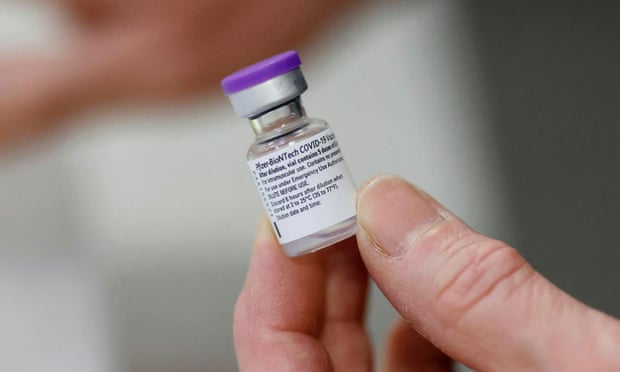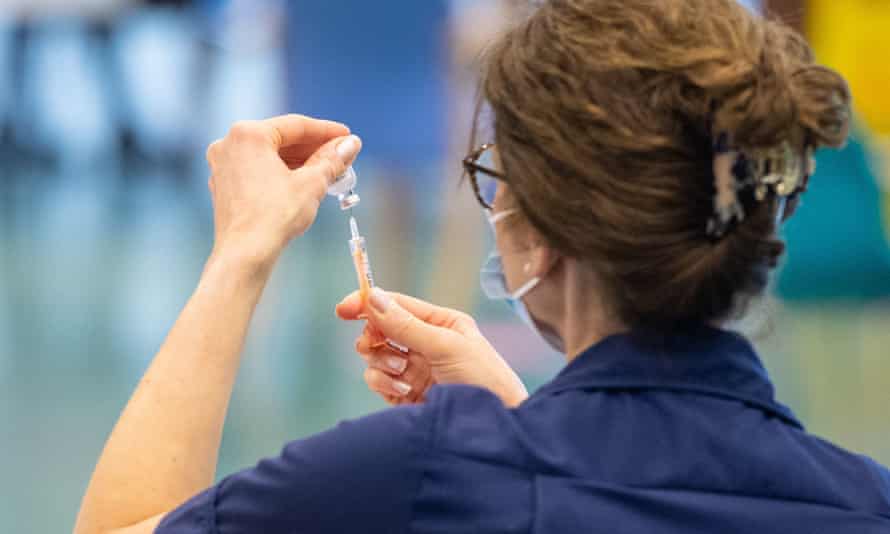The crisis over vaccine shortages in the EU erupted into a full-scale diplomatic row after Brussels moved to trigger a Brexit deal clause to establish border controls on doses moving into Northern Ireland from the Republic.
Within hours the European commission had reconsidered their decision after both Boris Johnson and the the Irish taoiseach Micheal Martin expressed their anger over the move and spoke directly to the European commission president, Ursula von der Leyen. Northern Ireland’s first minister, Arlene Foster, had also described it as a “hostile act”.
EU sources said the attempt to put controls on vaccines on the island of Ireland was “an error” but the crisis highlighted the growing political furore over vaccine supply.
Despite a late-attempt to attempt to row back, France’s president, Emmanuel Macron, warned in an interview with the Guardian that the EU had to “control” vaccine exports out of the bloc due to “questionable behaviour” by the Anglo-Swedish pharmaceutical company AstraZeneca.
Macron said controls needed to be erected out of concern that a major shortfall in doses by AstraZeneca, with which the EU has a 400m dose order, was a result of an “over delivery” of doses to countries outside of the bloc.
“It should be controlled because there is questionable behaviour and we will be receiving fewer deliveries that do not honour the contractual engagements agreed,” he said
Quick Guide
Vaccines: how effective is each one and how many has the UK ordered?

Pfizer/BioNTech
Country US/Germany
Efficacy 95% a week after the second shot. Pfizer says it is only 52% after the first dose but the UK’s Joint Committee on Vaccination and Immunisation (JCVI) says this may rise to 90% after 21 days.
The UK has ordered 40m doses and is rolling them out now
Doses Clinical trials involved two doses 21 days apart. The UK is stretching this to 12 weeks.
Oxford/AstraZeneca
Country UK
Efficacy 70.4% 14 days after receiving the second dose. May have up to 90% efficacy when given as a half dose followed by a full dose. No severe disease or hospitalisations in anyone who received the vaccine.
The UK has ordered 100m doses and has begun distribution
Doses Two, four to 12 weeks apart
Moderna
Country US
Efficacy Phase 3 trial results suggest an rating of 94.1%.
The UK has ordered 17m doses, to be delivered in March or April
Doses Two, 28 days apart
Novavax
Country US
Efficacy Phase 3 trials suggest 89.3%.
60m doses ordered by the UK, with distribution expected principally in the second half of the year
Doses Two
Janssen (part of Johnson & Johnson)
Country US
Efficacy 72% in preventing mild to moderate cases in US trials but 66% efficacy observed in international trials. 85% efficacy against severe illness, and 100% protection against hospitalisation and death.
30m doses ordered by the UK
Doses: One, making it unique among Covid vaccines with phase 3 results so far
The initial decision to enforce an effective vaccine border between Ireland and Northern Ireland followed the European commission’s announcement that it will enforce a new mechanism on Saturday obliging all vaccine suppliers to seek authorisation of their exports.
Exports of vaccines could be blocked if they are regarded as a threat to the timely delivery of doses to EU citizens from companies with which the bloc has contracts.
Under the Brexit withdrawal agreement exports cannot be restricted between Northern Ireland, which remains within the EU’s single market, and Great Britain.
To ensure doses could not pass into the United Kingdom through Northern Ireland, risking “serious societal difficulties”, the commission had said it had to monitor exports between the south and north of the island of Ireland.
Johnson and Martin, spoke directly to Von der Leyen, on Friday evening to express what sources described as “deep unhappiness” with the triggering of article 16 of the Northern Ireland protocol.
A No 10 spokesperson said the UK was “urgently seeking an explanation from the European commission” about the move.
“The UK has legally-binding agreements with vaccine suppliers and it would not expect the EU, as a friend and ally, to do anything to disrupt the fulfilment of these contracts,” the spokesperson said, adding that the UK has “reiterated the importance of preserving the benefits of the Belfast/Good Friday agreement”.
Later on Friday evening, the spokesman said Boris Johnson and Martin had held a “constructive discussion ”.
The Cabinet Office minister, Michael Gove, expressed his concern over the lack of notification of the triggering of article 16 to the European commission’s vice-president, Maroš Šefčovič.
Sources said Gove had informed the commissioner that the government would be “carefully considering next steps”.
Foster, the leader of the DUP as well as first minister, said: “This is an incredible act of hostility. By triggering article 16 in this manner, the European Union has once again shown it is prepared to use Northern Ireland when it suits their interests but in the most despicable manner – over the provision of a vaccine which is designed to save lives.
“At the first opportunity the EU has placed a hard border between Northern Ireland and the Republic of Ireland over the supply chain of the coronavirus vaccine.”
In his interview with the Guardian and a small group of other media, Macron also took a swipe at the AstraZeneca vaccine, saying it appeared to be only “almost ineffective” on people older than 65, though he acknowledged he did not have any official information to support the claim.
Macron said the EU was not seeking to damage vital supply chains but said the bloc had to ensure that pharmaceutical companies were not under-delivering “because of pressure from one or other countries”.
“Vaccine exports should be controlled, not blocked or banned, which would make no sense because we are also dependent on non-European production,” Macron said.
His remarks reflected rising tension over the issue of vaccine supply, which threatened to overshadow news that two more pharmaceutical companies reported positive trial results.
The twin announcements raised further hopes that the global pandemic can be brought under control once regulators have approved their safety and manufacturers have robust supply chains that allow them to deliver at scale.

On Friday, the US drugmaker Johnson & Johnson became the latest to announce positive trial results of its single dose vaccine.
It followed Thursday’s news that the Novavax vaccine, which will be manufactured in the UK, performed well in phase 3 trials.
Despite concerns raised in Germany about its efficacy for people over the age of 65, the European Medicines Agency also authorised the Oxford/AstraZeneca Covid-19 vaccine for use in all adult age groups on Friday.
The developments underlined the UK’s status as one of the world’s leading buyers of effective Covid vaccines – Britain has pre-ordered 30m doses of the Johnson & Johnson vaccine, and 60m Novavax doses.
The health secretary, Matt Hancock, said the UK was in “pole position” in the race to protect its population against the virus – .
“Our approach of buying abroad and making here at home is paying off,” he said.
But this approach, and Downing Street’s reluctance to offer any UK vaccine doses to the EU, has infuriated member states – the Croatian prime minister, Andrej Plenković, described it as “vaccine hijacking.”
The European commission continued to pile pressure on AstraZeneca to reroute some of its supply to the bloc, which has fallen far behind Britain.
Last week the company enraged EU officials by announcing that only 25% of the deliveries would be possible in the first quarter of 2021, owing to production problems at a Belgian plant.
But the company insists it cannot make good on the shortages by importing from the UK due to its obligations to the British government, which signed a contract three months before Europe.
In his interview with the Guardian, Macron said that Europe’s response to the contractual failure “will be proportional”.
He said: “Imagine the hypothesis that the British finish their vaccine campaign with success, what will they do? Stop European lorries from entering, when there is a total dependence on the continent. Bon courage [good luck]!
“And imagine the hypothesis that France, Italy, Germany have a vaccine strategy that is extremely ambitious and rapid. It will quickly fail if our neighbours don’t have the same vaccine strategy because our economies are integrated. France has 500,000 trans-border workers. So all this will only work if we do it together.”








